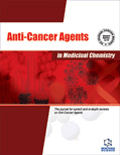To find the most relevant journal, please insert appropriate keyword to facilitate search.
Search Results: ACAMC

Anti-Cancer Agents in Medicinal Chemistry
ISSN: 1871-5206 (Print)
eISSN: 1875-5992 (Online)
- Medicinal chemistry, prevention, diagnosis, and treatment of malignant diseases
- In silico studies of drug-target interaction in anti-cancer drug assessment
- Underlying biology and medicinal chemistry strategies for anti-cancer drug synthesis and development
- New drugs related to a specific target or target class for anticancer drugs
- Drug repositioning in cancer
- Clinical cancer research
- Radiotherapy and systemic treatment of cancer
- Other related areas
Special Issues devoted to crucial topics, providing the latest comprehensive information on cutting-edge areas of research and technological advances, are welcome.
Anti-Cancer Agents in Medicinal Chemistry is an essential journal for every medicinal chemist who wishes to be kept informed and up-to-date with the latest and most important developments in cancer drug discovery.
Special Issues With Active Call for Papers
Signaling and enzymatic modulators in cancer treatment
Cancer accounted for nearly 10 million deaths in 2022 and is considered the leading cause of worldwide mortality. Cancer outcomes can be improved through appropriate screening, early detection, efficient clinical treatment. Chemotherapy, radiotherapy, and surgery are the most important approaches for the treatment of several types of cancers. However, intrinsic or acquired resistance and metastasis are still major obstacles to a successful cure. Outstanding progress in genetics and molecular biology has provided novel molecular targets... see more
Advances in Nanomedicines and Targeted Therapies for Colorectal Cancer
Colorectal cancer remains a significant global health challenge, with high incidence and mortality rates despite advancements in treatment strategies. Conventional therapies often face limitations such as systemic toxicity, drug resistance, and suboptimal targeting. The advent of nanomedicines and innovative drug delivery systems offers new hope for overcoming these challenges and improving patient outcomes. This Special Issue aims to showcase the latest research and developments in the application of nanomedicines and targeted therapies specifically for colorectal... see more
Innovative targets in medicinal chemistry
Medicinal chemistry continuously evolves in response to emerging healthcare needs and advancements in scientific understanding. This special issue explores the current landscape of innovative targets in medicinal chemistry, highlighting the quest for novel therapeutic avenues. From traditional drug targets such as enzymes and receptors to emerging targets like protein-protein interactions and DNA/RNA, this abstract delves into the diverse spectrum of molecular entities under investigation. It discusses the rationale behind targeting these novel entities, emphasizing their... see more
Rechallenge Therapy in different types of cancer
Cancer is responsible for approximately 8 million deaths annually worldwide. GLOBOCAN 2020 reported 19.3 million new cases of cancer, which is projected to increase to 28.4 million by 2040. In the future, female breast cancer will be the most common cancer (11.7%), followed by lung (11.4%), colorectal (10.0%), prostate (7.3%), and stomach (5.6%). As far as cancer-related mortality is concerned, lung cancer is the leading cause, responsible for 1.8 million deaths (18%), followed by colorectal... see more
Discovery of Lead compounds targeting transcriptional regulation
Transcriptional regulation plays key physiological functions in body growth and development. Transcriptional dysregulation is one of the important biomarkers of tumor genesis and progression, which is involved in regulating tumor cell processes such as cell proliferation, differentiation, and apoptosis. Additionally, it plays a pivotal role in angiogenesis and promotes tumor metastasis and drug resistance by regulating invasive metastasis and immune escape. The dysfunction of key proteins involved in transcriptional regulation mediates aberrant gene expressions that... see more
Induction of cell death in cancer cells by modulating telomerase activity using small molecule drugs
Telomeres are distinctive but short stretches present at the corners of chromosomes that aid in stabilizing chromosomal makeup. The resynthesis of telomeres is supported by the activity of reverse transcriptase ribonucleoprotein complex telomerase. There is no telomerase activity in human somatic cells, but the stem cells and germ cells undergo telomerase activity where every division of cells shortens the length of telomeres at chromosomal ends. In somatic cells, when a critical length of telomeres is... see more